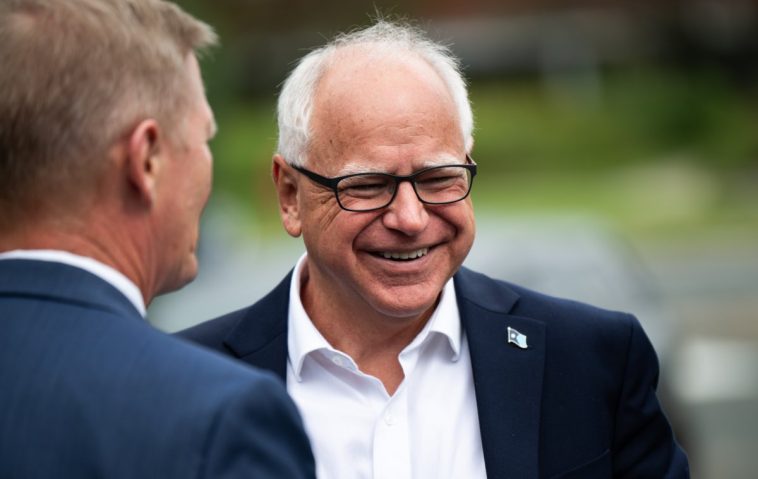Minnesota Governor and Democratic Vice-Presidential candidate, Tim Walz, is under scrutiny by the U.S. House Committee on Oversight and Accountability for his claimed connections with China. Walz unabashedly admits pride in his Chinese relationships that have been developing since 1989. The committee, having spent considerable time delving into the Communist Party of China’s (CCP) political operations, is expressing keen interest in these disclosures.
The committee is keenly interested in understanding how the CCP manipulates high-profile figures in political circles to favor the interests of China’s communist regime. To gain clarity, the Chairman of the Committee, Representative James Comer, a Republican from Kentucky, has made formal requests to FBI Director Christopher Wray for details related to Walz’s interactions with individuals or entities connected to the CCP.
Comer has requested any and all information, including documents and communications in the FBI’s possession, corresponding to Walz’s interactions with entities or officials connected to the CCP. The nature of the information is anticipated to shed light on the operations of the CCP and the potential implications for political landscapes.
One specific investigative entity within the FBI, the Foreign Influence Task Force, focuses its energy on explorations into such activities conducted by CCP organizations. However, Comer has criticized the FBI’s lack of cooperation. He verbally expressed the agency’s reluctance to provide valuable information on the matter as indefensible.
Allegations against Walz revolve around his recent meeting with Zhao Jian, the CCP Consul General, to deliberate on ‘China-US relations and sub-national cooperation.’ His acceptance of a fellowship from the Macau Polytechnic University while serving in Congress is also a contentious matter.
During his fellowship, Walz had extended support towards China’s Belt and Road Initiative. This initiative, according to critics, serves as a strategy devised by President Xi Jinping to expand China’s influence globally, raising suspicions about Walz’s involvement.
Another point of contention is a financial matter. Walz acquired over $2 million in funding and lobbied for an additional $5 million federal earmark for the Hormel Institute, a Minnesota-based medical research center. This organization has established working relations with the Wuhan Institute of Virology in China, a connection that becomes critical in the wake of the coronavirus pandemic.
The Hormel Institute has reportedly partnered with the Beijing Genomics Institute, characterized by the Pentagon as a ‘Chinese Military Company.’ Comer also highlighted this point to emphasize the possible implications of Walz’s facilitation of these partnerships.
It was these details concerning Walz’s professional engagements that elicited the committee’s interest. The concerns grew during an investigation into the methods employed by the CCP for infiltration and influence on federal agencies, including the strategies employed by the FBI itself.
The committee has expressed apprehensions about Walz’s historical affiliations with CCP-related entities after an FBI briefing on CCP influence operations in July 2024. According to them, these connections bore the hallmarks of CCP’s influence campaigns.
The committee went as far as to express concerns that Walz’s interactions with Chinese officials and organisations might be exploited by the CCP to affect his decision-making. As it stands, his position could afford the CCP a degree of leverage, should Walz be elected as vice-president – a possibility that is worrisome to the committee.
Walz, on his part, sees his connect with China differently. He has been to China about 30 times since 1989, instead of recoiling from the connections, he holds them in high regard. His bond to China began in the same year as the brutal Tiananmen Massacre – a fact that might seem disconcerting to some.
Walz didn’t shy away from working in China after the tragedy that unfolded at Tiananmen Square in 1989. As a teacher, he took to heart the plight of the Chinese people. He did not merely fulfill his responsibilities but felt it was more important than ever to share the story of the Chinese people’s struggle.
Reflecting on his experience in China, Walz made remarks of empathy towards the Chinese individuals subjected to ill-treatment and duplicity by their government. He praised their kindness, generosity, and capability: ‘They just gave and gave and gave to me.’
Walz’s wife, Gwen, also shared the profound impact this experience had on her husband. The couple chose to get married on the fifth anniversary of the Tiananmen massacre, a date that they would ‘always remember.’
BREAKING: GOP Oversight Committee is investigating Kamala Harris’ VP pick Tim Walz for alleged ties to the CCP.
Below is the letter that was sent to FBI Director Christopher Wray, requesting information relating to Governor Tim Walz ties to the CCP. pic.twitter.com/aNNoijykIq
— Leading Report (@LeadingReport) September 15, 2024


